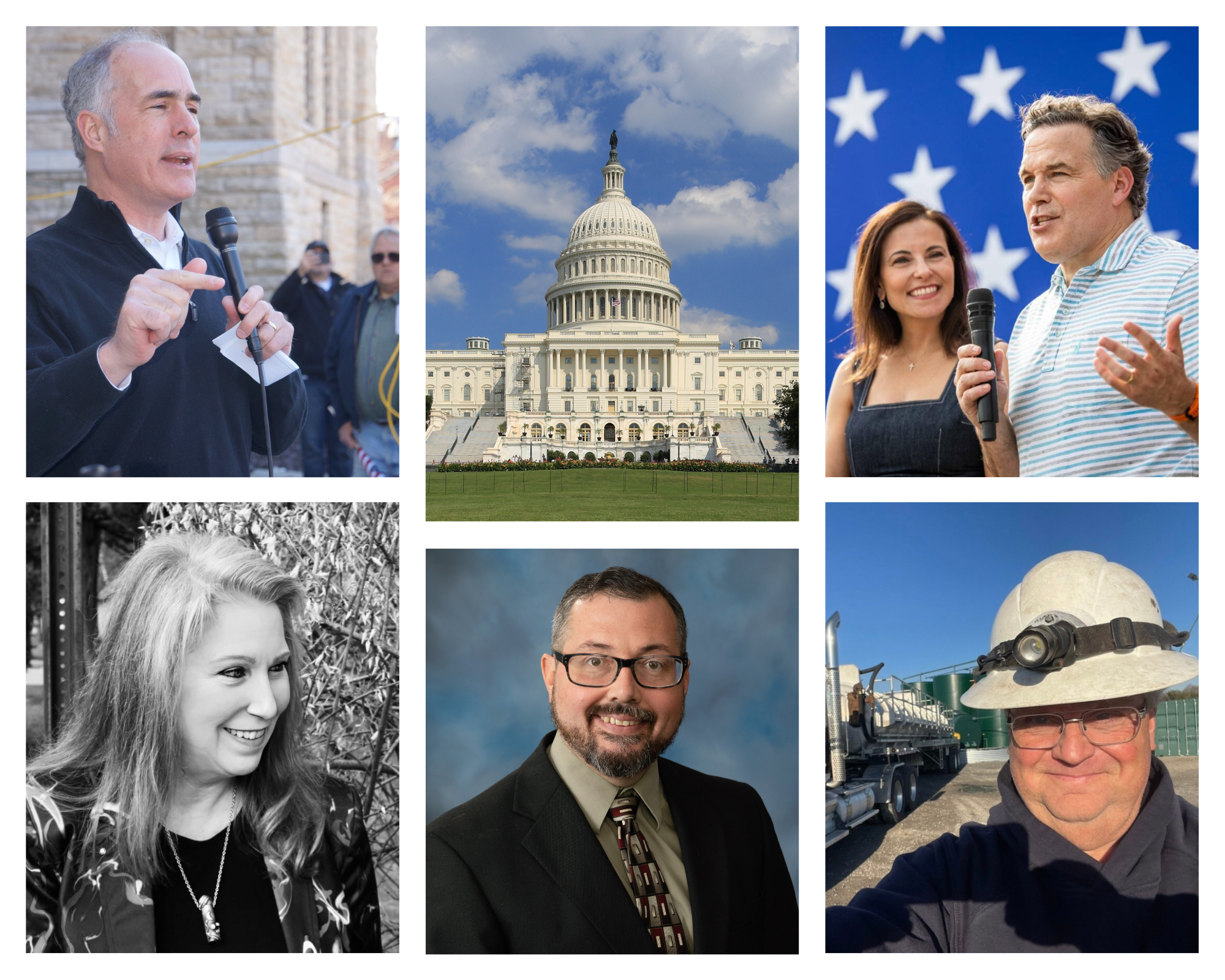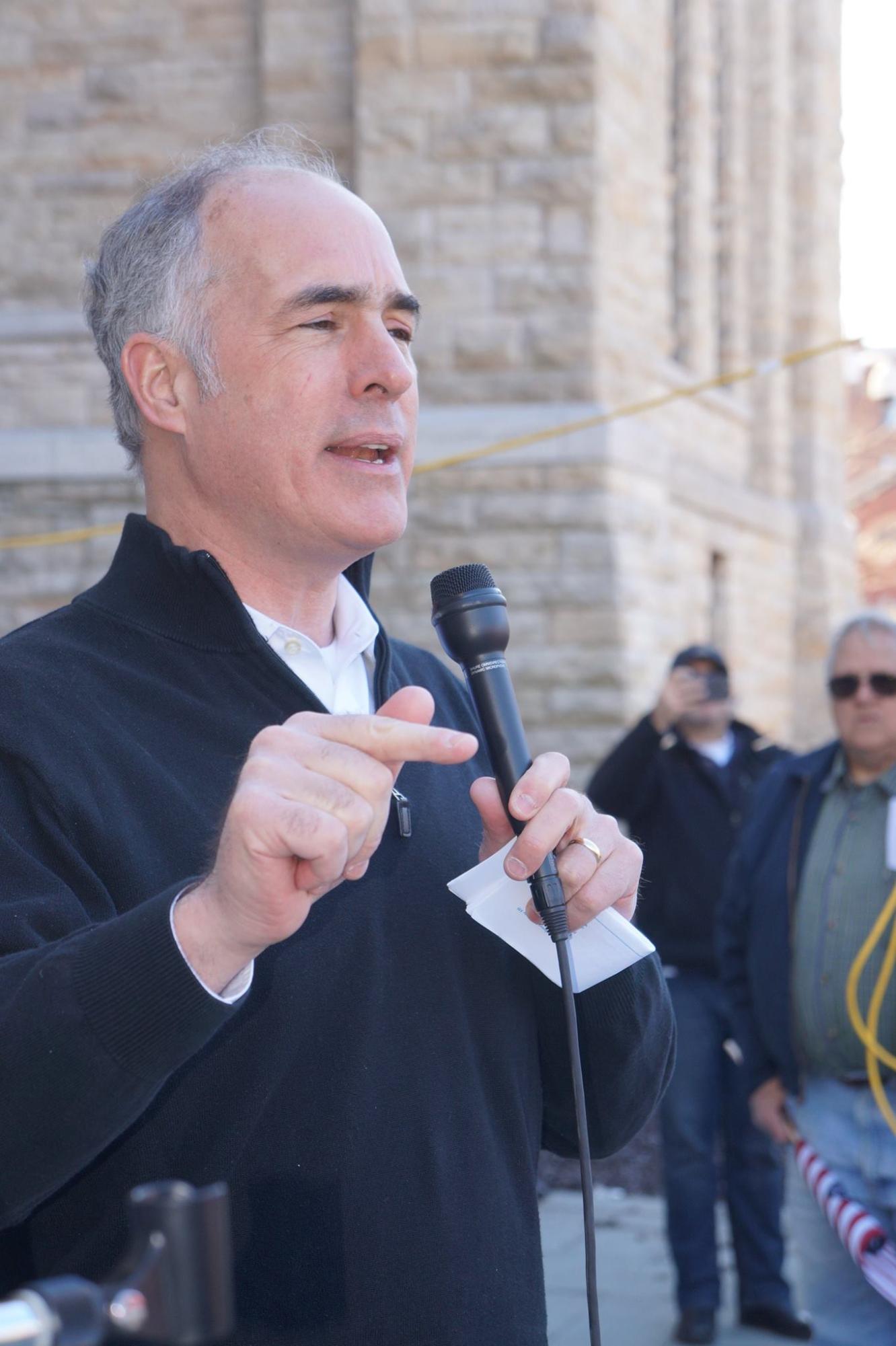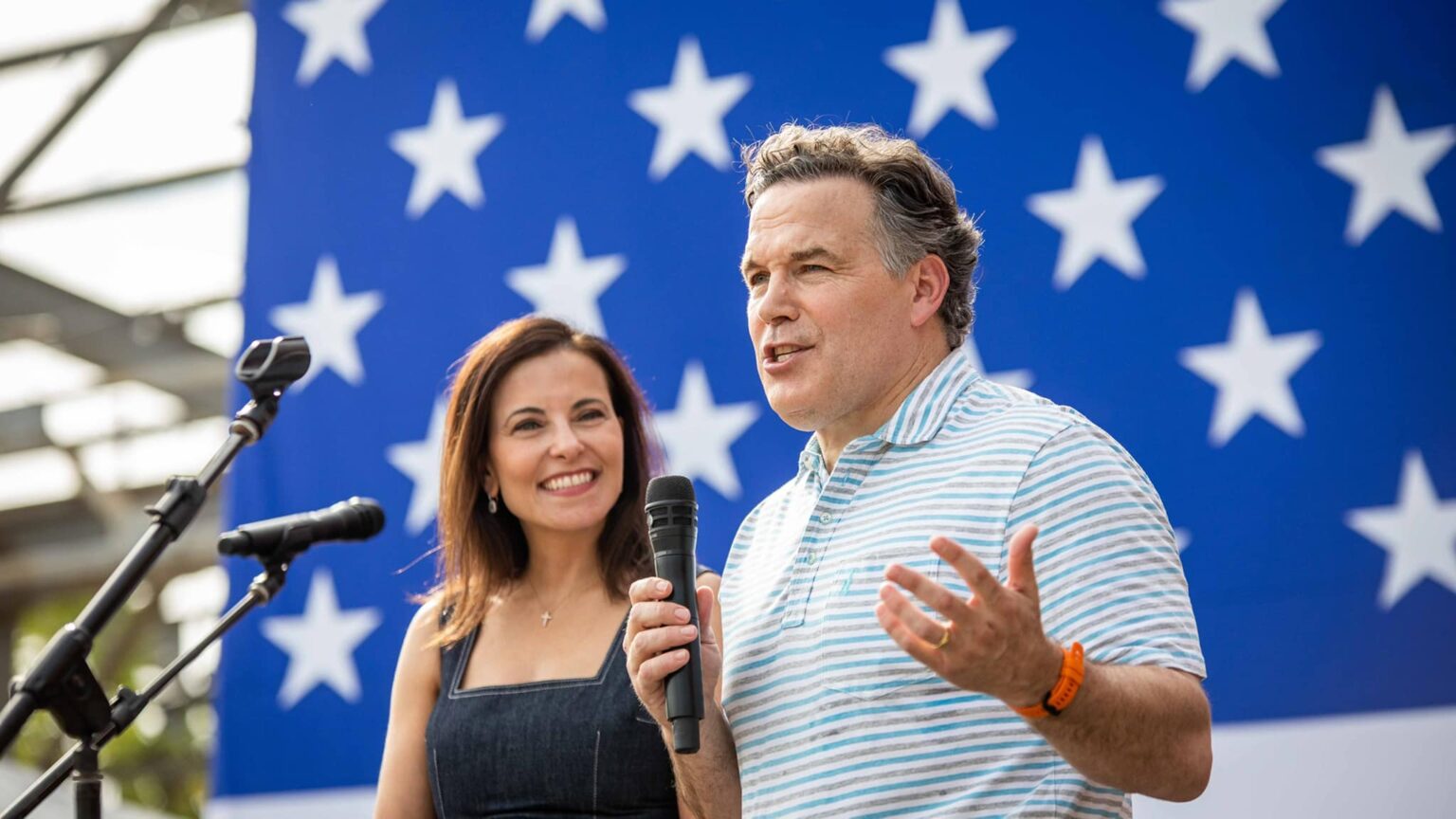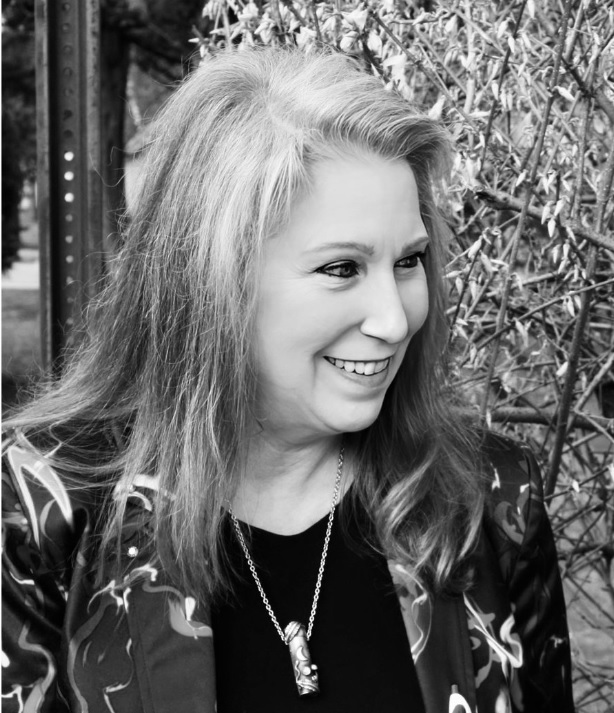An in-depth look at the Blair County ballot: Federal Senate Q&A

As the 2024 election approaches, candidates running for positions nationwide, statewide and locally are preparing for Tuesday, Nov. 5. One such position is United States Senator, representing Pennsylvania. Federal Senators’ duties are to take “action on bills, resolutions, amendments, motions, nominations and treaties by voting.” This year, Bob Casey (Democratic Party), David McCormick (Republican Party), Marty Selker (Constitution Party), Leila Hazou (Green Party) and John Thomas (Libertarian Party) are competing for this position. The opinions voiced by the candidates are the candidates’ own and do not reflect the beliefs of the Mountain Echo staff. Each of the candidates breaks down what they stand for in this upcoming election.

Unable to be reached for comment.

Unable to be reached for comment.

Unable to be reached for comment.

Unable to be reached for comment.

Q: Why did you decide to run for U.S. Senate?
A: “I have been interested in politics for a very long time. I actually majored in political science pre-law, but I didn’t really want to go into law. I decided to go into teaching instead, so I have worked in education for the past 20 years or so. I wasn’t planning on running for the United States Senate. I have attended the Libertarian conventions here and there. This past year, I went to the convention. A couple people approached me at the convention, and said, ‘Hey, would you consider running for United States Senate?’ And my first answer was, ‘This isn’t something you do without asking your wife first.’ So they were like, ‘Well, why don’t you ask your wife?’ So I did, and she said, ‘Yeah, that’s fine.’ But I also wanted to know why these guys didn’t run themselves instead of asking me. They responded, ‘We’re not over 30 years old. The Constitution of the United States says that to be a Senator, you have to be at least 30 years old.’ And this was back in March whenever we still had Joe Biden as a Democrat presidential candidate and Donald Trump as a Republican presidential candidate. I kind of laughed to myself, thinking, ‘you know, the other parties are desperately trying to find leaders who are under the age of 80, whereas our party’s problem is the opposite. We’re looking for people over the age of 30 who can run for the United States Senate.’ I thought, ‘well, I can’t argue them out of being in their 20s.’ I decided to take one for the team. There we had another candidate that was running, and I didn’t expect that I would beat him. He was a good candidate. In 2022 he got enough votes to achieve minor party status for the Libertarian Party that required its welcome, its formula, but it almost never happens in a midterm election. Normally, whenever we get minor party status, it happens in a presidential election year. And he actually got it in a midterm election year; he had campaign funds; he was in a good position to win. We had a debate at the convention between him and myself, and after the debate, I ended up getting over 60% of the vote. I was really surprised, because, like I said, this other person was a good candidate. I guess they liked my message and chose to go with me, even though I literally decided to run that day.”
Q: You said that you were in teaching before, so how is your teaching job or experience going to help you if you get elected?
A: “I’m not running to get elected as a third party candidate. I actually told them during that debate I just mentioned, I told the Libertarians that we ought not pretend like we’re going to win the election because basically that’s a lie. We know that it’s going to be the Republican or Democrat who wins. But still, I think that the Libertarian Party has a very important role, and one of their main roles is to educate the public about what Libertarianism is, how limited government could help people, how limited government could make America, or Pennsylvania, for that matter, more peaceful and profitable. Since I am running in a position where I think the campaign is all about education, the fact that I am an educator, and I still work in education is an important attribute that I have.”
Q: What job do you have specifically in education?
A: “Right now I coordinate professional learning for a cyber charter school.”
Q: As you said, you view your position and your party as a platform for voters to learn more. What three issues would you like voters to know your stance on?
A: “My campaign slogan is ‘peace, prosperity, Pennsylvania’, and I want America to pursue a policy of peaceful relationships with foreign countries. Right now we’re funding wars all throughout the world. We’re funding wars, and that is taking resources away from America and putting them in all kinds of other countries, and it’s making America less safe. But the reason both Republicans and Democrat politicians support wars is because the people who manufacture weapons, the people who have the big oil lobby. There are a lot of big money interests who make money off of war, and they take that money that they make and they use it to back Republican and Democrat presidential candidates. So that is a big incentive for Republicans and Democrats to support endless wars. So that is what costs American lives, that costs American dollars. But the way that both Republicans and Democrats want to fund the wars goes into that. Second, I said the three issues were prosperity in Pennsylvania and the way they fund the wars isn’t by directly taxing the people. Both Democrats and Republicans recognize that tax increases are very unpopular. So they want to fund these wars. They want to give their cronies in the military industry money, but they don’t want to tax us. So how are they going to do that? The way they do that largely, is by printing the money they use, basically, they use different techniques through the Federal Reserve System to basically borrow the money into existence. And when you print more money, it always leads to inflation. Now we often think that inflation affects everybody, equally, whether you’re rich or you’re poor. You see prices rise, and it affects you. But that’s not exactly how inflation works. Inflation benefits people who get the new money first. So this is why we see 50 or five out of the 15 wealthiest counties in America, five of them are located immediately outside of Washington D.C., because those counties outside of Washington DC get government money first, and then they spend the money. And it’s only after that money gets spent around the economy that we see prices rise so they get to spend the money, the newly printed money, before prices rise. Those of us here in Pennsylvania, in rural Pennsylvania, like places like Altoona, they see points increase for a long time before they see any of that newly printed money. So it harms people in Pennsylvania and it helps people in Washington, D.C. And that’s my third P in Pennsylvania. I would like to see resources stay right here in Pennsylvania, rather than be sent to places like Washington, D.C. The three P’s of my campaign are ‘peace, prosperity and Pennsylvania.’”
Q: I have a few key issues that I feel are very important to our high school population and the nation at large which I would like to address. First, what is your stance on taxes?
A: “Okay, as a Libertarian, the Libertarian Party itself is founded on a principle, and the principle that the Libertarians believe in is what’s called a Non-Aggression Principle. And a Non- Aggression Principle states that ‘it is always wrong for people to initiate aggression against other people.’ So that the Non-Aggression Principle, or the NAP, is something that we try to follow in all aspects of life. When people hear the Non-Aggression Principle, the fact that it’s always wrong for people to initiate acts of aggression against other people, they often think that’s a pretty basic philosophy, something that we all learn whenever we’re children. It’s something that I’ve taught my own children, and I’m teaching my grandchildren that you should not initiate access. You don’t hit people and you don’t take their stuff, right? But the difference between Libertarians and other people who say that they believe that you don’t hit people, you don’t take their stuff, is that Libertarians apply that to the government as well. So it’s always wrong to initiate active aggression. That means that all interactions between adults ought to be consensual. I can’t take something from you without your consent, and that applies to the government. The government ought not take anything from anybody without their consent. That means that taxation is wrong, so we would ideally eliminate taxation entirely.”
Q: I have a follow up question to that. As you said, you support getting rid of all taxes. If you do so, what will happen to the things that are governmentally funded by tax money such as public education and schools such as Altoona Area High School?
A: “We would ideally privatize schools. That doesn’t mean that schools would not exist. It means that right now, we spend a lot of resources on schools, and we would find private channels for those resources. Now, I would not eliminate these entirely immediately, or I would not eliminate government funding entirely immediately. I would gradually roll that back, because, unfortunately, we do have a lot of resources in schools, but I would try to privatize it as soon as possible. Right now, we spend around $20,000 per student per year on K-12 education. It’s a lot of money. That means from kindergarten through twelfth grade, you’re looking at about over a quarter of a million dollars every student has spent on them, from K through 12. That’s a lot of money, and I don’t know if we’re getting a quarter million dollars worth out of it because the government always leads to the inefficiency of waste. A lot of the money that we see is spent on administration. We’ve seen a lot of increase in administrative costs while teacher salaries remain flat. The private sector could do that better. The private sector finds efficient ways to use money, because if they don’t operate efficiently, they suffer losses. When the government doesn’t operate efficiently, they don’t suffer losses. And as a matter of fact, whenever they have failure, it’s often they can use that failure as a reason that we need more funding. Our students are failing, we need more funding. Our bridges are collapsing, we need more funding. Our war isn’t going the way it’s supposed to go, we need more funding. Whereas in the private sector, whenever things don’t go well, you figure out a way to make it go well. So, the private sector could fund education a lot better than the government could. What I would do in education would be, I would take that $20,000 that we’re spending per year, cut it down to something closer to 11 or $12,000 and just send that to the families and privatize all the schools and say, ‘now you have that money to get to school and find sufficient ways for it,’ and we could save a lot of taxpayer money by doing something like that.”
Q: What is your and your party’s stance on abortion?
A: “Our party actually has no stance on abortion because abortion is is an issue where there can be a Libertarian case made for either side, depending on when you define the beginning of life. We are against the initiation of acts of aggression, and if an unborn human is an alive human, then an active abortion is an initiation of violence against that human. However, if it is a clump of cells, then preventing a woman from getting an abortion would be an act of aggression against that woman. Now I think that the scientific and moral evidence is that that unborn baby is a human being, and any abortion is an act of aggression against that human being. Therefore I am pro-life.”
Q: What is your stance on the border and immigration to the U.S. in general?
A: “Ideally, I would love to see a world where people could freely move to wherever they wanted; however, we don’t live in an ideal world. Right now, people cross the border for a number of reasons, and a lot of the time whenever you study immigration, they talk about push factors and pull factors. One of the pull factors that attract people to the United States is the fact that the government spends a lot of money on immigrants, so I would like to eliminate that. I would want to eliminate any of the government funding that goes to immigration, and instead, what I would like to see is a pretty basic policy, where we do a criminal background check on anybody who’s coming into the country, so we make sure that we’re not bringing in criminals, and we require any immigrant who’s coming into the country to pledge that they will never accept government funded housing, government funded welfare, government funded schooling or government funded health care. That would mean that we would be attracting the most productive people from around the world to come to America, and that’s going to make America more prosperous because people would have to be productive. They wouldn’t be able to fall back on a government safety net. There would be no safety net there. So they, anybody who immigrated to America, would have to believe that they are productive enough for themselves, and we would see that America is an interior of immigrants. But throughout a lot of America’s history, those immigrants didn’t have a safety net. Whenever the first Thomas came to America, he worked for the railroads in western Pennsylvania, making $10 per month. Now, $10 per month isn’t a lot, but it was $10 based on a strong currency. I mean, even back then, $10 was a lot, but it could buy more and the currency was stable. Because the currency was stable, we were able to budget, and when you’re able to budget, you can prosper, even if you’re not making a lot of money. In order to make this system, we would need to make sure the government isn’t constantly printing more money, so people could budget, and then they could plan for the future, and that would be for both immigrants and people who are natives.”
Q: I have a question going along with the economy and inflation. As you just said, in your party platform, it states that you support ending federal student loan guarantees and special treatment of student loan debt and bankruptcy proceedings. So if students do go on to post-secondary education, will there be any help to pay for that? Or will they be on their own?
A: “Yes, most likely, there absolutely would be help. It used to be that people could afford to send their kids to school on a single income. As a matter of fact, the first Thomas that I was just talking about who was born here in America, one of his sons left school to become a pharmacist. His first job, he was making $10, and he was able to save up enough to send one of his sons to school to be a pharmacist in the late 1800’s, before there were any government funded student loans and things like that. But whenever you have cheap loans, one of the things that leads to is more expensive costs. If it’s easy to borrow money to do something, whether it’s college or buying a house, then the price of those things is going to increase. Since the federal government had started guaranteeing student loans, what we saw was a skyrocket in the price of college, and that is unfair to our young people. That is why our young people graduate with crippling loan debt, because our government policy has driven up the price of college to unaffordable levels. If we get the government out of that, we’re going to see [college tuition] go down. Now that still doesn’t mean it’s going to be affordable for everyone, but many colleges have endowments that would more than be able to offset the fact that some people can’t afford college. As a matter of fact, you look at a place like Harvard. Harvard endowment is like the sixth largest; the sixth largest hedge fund in the world is Harvard. Harvard’s endowment, as a matter of fact, they make more money off the interest on their endowment than they collect in tuition every year. They could use programs like that to offset college, offset some of the tuition for for students who can’t who can’t afford college, though you could also people used to work their way through college, even when the the minimum wage was was lower, they were able to find jobs that were able to pay for my kids their college expensive expenses. Why? Because college was so much cheaper before the government stepped in and decided to quote, ‘help matters’ by making things way more expensive.”
Q: Concerning the environment and global warming and issues like that—with less government regulation, as you said, how will you combat climate change and also ensure clean air and water for the people when things like the corporation emissions aren’t regulated anymore?
A: “Just because we don’t believe in something like the EPA (Environmental Protection Agency) doesn’t mean we don’t believe in regulation. Regulation could exist without government regulators. As a matter of fact, regulations do exist without government regulators. I live about 45 minutes outside of Pittsburgh, and there’s a legend. If you want to read an hilarious story, look up the legend of the fake Burger King in Pittsburgh, it’s actually a true story. There’s a Burger King in Pittsburgh that lost their Burger King franchise license because the Burger King regulators, not the government regulators, went in and said, ‘This restaurant is not performing up to standards,’ and because of that, now they want to continue to be a Burger King. So, they started calling their things still under Burger King names, and putting things in brown plastic bags, wrapping them in sandwich baggies like you pack a lunch. It became hilarious, and eventually the Burger King came in and shut them down entirely. Now this was an example of private regulation that wasn’t government funding coming in, so we could have private regulators. We could have private regulators come in and say, if you want to have our stamp of approval on your product, you need to meet these industry standards, and that happens all the time. As far as the environment, we saw a change in government or in court policy that happened in the late 1800’s that could have only happened if there was a monopoly on government courts. And what they did was it used to be that private property rights included your right to safe soil and your right to safe water. If I had a stream running through my land and there was a factory that lived upstream from it, and they polluted that route, I could sue that factory and win a settlement against that factory because they were violating my property rights. And in the late 1800’s they decided, ‘You know what, we want to see industry grow so we’re going to violate people’s private property rights, and no longer accept these types of cases.’ As Libertarians, we have a strong belief in property rights, and we would return those protections so that if, if a company violated private property rights by polluting their neighbors, they could be sued, and that would be one way to to offset a lot of that, a lot of the pollution that we do see.”
Q: So am I understanding correctly that under Libertarian beliefs you would like to decrease the power of the executive and legislative branch but keep the judicial branch as it is?
A: “I would believe in a system of private courts, so we already have private litigation that happens, and a private system of courts would have to pursue just outcome, because nobody’s going to go to a court that always sides with one side or always sides with the other side. So I believe that we ought to have as much private education as possible under the law.”
Q: I have a question about the First and Second Amendments. What is your party’s stance on them?
A: “We are very much in favor of both of those. As a matter of fact, the Second Amendment is needed so we can protect the First Amendment, and we see in country after country where they confiscate guns, people are arrested for posting things on social media. In the UK (United Kingdom), we are seeing people arrested for what they share on social media. In Canada, we see people arrested for the speech that they made during the covid pandemic. In Australia, we see people arrested for different speeches that they make. If you sacrifice your rights to keep and bear arms, sooner or later, you’re going to be sacrificing your right to speak, your right to practice a religion and the right to press. All of these things are going to follow down the line after sacrificing.”
Q: What is the Libertarian stance on the balance between federal and state power? I understand that you want to decrease government regulation, but how would that impact the federal and state view?
A: “The third P in my ‘peace, prosperity and Pennsylvania’ is about returning as much power to Pennsylvania as possible. Now, there are some Libertarians who disagree with that. Most Libertarians I talked to are in agreement that it’s better. Ideally, all the power would be held in the rights of individuals. The more local that power is, the better. Because the individuals have a lot more sway over their local government than they do their state government, and a lot more sway over their state government than they do the federal government. As an individual citizen, you can make a big difference by showing up to your local school board meetings or your local city council meetings. Just one or two individuals can sway things tremendously by making an effort to show up to those meetings. Oftentimes nobody shows up to those meetings besides the people who are elected. So if you show up, you can make a big impact there. You can make less of an impact if you go to Harrisburg, and you make almost no impact at all by going to Washington DC. But where’s the power? The power is in Washington, DC. That’s where so much of our tax money goes. That’s where so many decisions are made. I would like to return those decisions to a more local area so that people could have power over those decisions.”
Q: I would like to return to the Second Amendment question. I think about two years ago, the high school had a school shooting threat, and it was a hoax, thank goodness, but we had SWAT teams in the high school, so this is a little bit of a concern for our student population. If you decrease gun regulation and support the Second Amendment, how will you combat school shootings?
A: “School shootings are a relatively new thing, a relatively new phenomenon. They always existed, but the rate of them has increased since I’ve been out of school, and part of the reason for that is that we’re seeing a lot of cultural deterioration. We’re seeing a lot of gun free school zones. Whenever I was a kid, people used to bring shotguns. I went to a small school, and people brought shotguns to school. You had your gun rack in the back of your truck, and you had a gun there. It was actually after schools were made gun free that we saw a huge increase in the number of school shootings, and that’s because people who want to have a high death toll go to a place where they know people are unarmed, and that happens time and time and time again. So it’s one of those policies, where again, like I was saying earlier, how the government wanted to make college more affordable, and what they ended up doing was making it more expensive. The government wanted to make schools more safe, and what they did was make them more dangerous. If we were to privatize schools, then schools that were safer would probably get more kids to come to those schools. And you don’t make schools safe by banning law-abiding people from having guns there. People are around people with guns all the time; if you go to your Walmart, you’re around people who are armed. You’re around teachers who are armed. I guarantee you in Blair County, Pennsylvania, if you go to go to a Walmart or Target, you are around people, teachers who are armed in that part of the state, but those same teachers, whenever they go to school, have to be unarmed because the government requires it of them, and this leaves their student body less safe.”
Q: For energy and transportation, without government regulation, how are you going to ensure that certain types of energy production won’t dominate the market, because corporations will no longer have to abide by government rules? For example, an example that applies to our high schoolers here, a lot of us are starting to drive and own our own cars. So how can you ensure that gas prices and energy prices for homes won’t fly through the roof?
A: “Competition solves us, as you probably learned in your American History class about Standard Oil and the Standard Oil monopoly. But probably what they didn’t teach you is that throughout the late 1800’s oil prices were falling. They were falling every which way. Because every time Standard Oil went to raise prices, because they did want to, they wanted to pursue those classic monopolistic patterns where you say that they overtake an industry and then raise their prices, but every time they went to raise their prices, new firms would enter the market and undercut them. So what we saw were prices falling tremendously throughout that period. And so competition does keep up downward prices on energy and energy prices, as well as so many other prices. So what happens? A lot of times the regulatory agencies suffer from what’s called regulatory capture, and that means that the regulators of those regulatory agencies are industry insiders, and what industry insiders do is they make regulations so costly that it becomes impossible for startups to enter the market. And who does this provide a benefit to will it provide the benefit to the already established mega corporations? So we see it in regular in regulatory agency after regulatory agency that the industries end up supporting more regulation because they know that by supporting more regulation, they can afford an army of lawyers who can read the regulation that their lawyer wrote, their startups can’t afford that, so the startups never able to make it into the market. So by deregulating, you can keep downward prices on things like energy, by getting rid of the regulatory cap.”
Q: I want to return to education and costs and college debt. In Section 2.12 of your party platform, it says that you would restore authority to parents to determine the education of their children without interference from the government. You already touched on this. So currently, Child Protective Services intervenes if parents are unable to take care of their children properly. How will you ensure that parents will take good care of their kids and provide them an education so they will become competitive citizens in the free market?
A: “For the most part, parents do care for their kids. I rarely meet a parent who doesn’t love their kids. Kids are oftentimes assaulted while at school by other students, and, unfortunately, by teachers. So the idea that government officials are going to love kids more than their families is pretty absurd. As a matter of fact, we have kids who every time they are ready to leave school, to go home. If they cried hysterically, the teachers would be compelled to call Child Protective Services on this kid, on those parents. However, whenever kids cry hysterically, whenever they’re sent to school, those parents are told you send those kids to school. Anyways. That sounds like an awfully awkward situation to me, so there are indeed cases of parents who do abuse their kids, and I think that the government ought to step in and stop that. But the idea that the best way to do that is by pulling kids away in tears, pulling them away whenever they’re four or five years old, and sending them to a government official whose government officials have a long history of abuse is certainly not the best way to do it.”
Q: What is your stance on the recent developments of gender identity and the LGBTQ+ community?
A: “I think that everybody ought to have equal rights. And equal rights means just that. It means that we ought not to have certain classes of people who have special rights. Right now we have a situation where there are what are called protective classes who are indeed given special rights. And I would work for a situation where people had equal rights, not special rights.”
Q: Do you want to add anything else?
A: “We’d like to make one more statement. I started off by saying that I don’t expect a win and that probably sounds kind of strange from a politician. Everyone says vote for me because I’m the winning candidate. So it makes it sound like people might not want to vote for me, but I think that people can make a profound difference by voting third party, even though third parties do not owe or likely do not win. And one example I gave to that is the very first presidential election that I was interested in was in 1992 and in 1992 we had the Republican candidate was George H W Bush, who everyone just called George Bush back then because he was the only one. George H W Bush, Bill Clinton was the Democrat president, and we had Ross Perot, and Ross Perot was running on a single issue, and that was balancing the federal budget. And people called him crazy for thinking that we could balance the federal budget because we just had 12 years of small government, quote, small government Republicans and throughout those 12 years, we saw the budget deficit one thing, and that was grow and grow and grow and grow. So how was this guy going to do what the small government Republicans couldn’t do? How was he going to balance the federal budget? So he ran and he bought it. He was a multimillionaire. He would have been a millionaire by today’s standards. He bought a lot of ad time, and he talked about balancing the federal budget, and he ended up getting 19% of the vote, so he lost. But do you know what happened two years after that, the Republicans put a balanced budget into what they called their Contract with America, and a couple years after that, Democrat president Bill Clinton signed a balanced budget into law. And the reason that happened was because 19% of voters were courageous enough to vote for a third party. They didn’t throw their vote away on the same old, same old. They were courageous enough to vote third party, and then the Democrats and the Republicans scrambled to try to win back those voters, and the way that they did that was by adopting the policies of Ross parole. People can make a difference by voting for a third party, even if the third party doesn’t win.”
Q: Why should freshly-18 high school students vote for you?
A: “Because that is the way to make a difference. The Republicans and Democrats have been in charge for so long, and they they think that that people are just going to automatically vote for them, but whenever they vote, whenever people vote third party, especially young like, like I said, it was, it was two people in their 20s who approached me and asked me to run for Senate. So young people are starting to see this, they’re starting to see that the Democrats and Republicans are just in it for the mega corporations who are out there. They’re not out there to make a difference. So that the way you send a message to say, I want somebody who represents me is by voting for third parties, and then that’s how they they get the message that if we hey, if we want these young, young voters to be voted for us in the future, we have to start listening to them. And the way you do that is by voting for a third party.”


![Inspiration. Ten years ago, Price and Saboe found a way to memorialize Dodson and her impact in the volleyball program. The Erin Dodson Memorial volleyball games highlight Dodson's determination and positivity, even in the face of obstacles. "[We wanted] to be able to give to others based on the legacy that Erin had created as a person," Saboe said. "[We] thought honoring her like this would be the best way that we can honor her." (Courtesy of Sandra Mitchell)](https://aahsmountainecho.com/wp-content/uploads/2025/10/IMG_1319-1-e1759443066570-1200x658.jpg)




